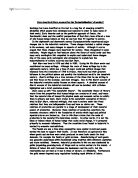The condition of labour is not a simple one but is the main basis for Locke’s views. Locke claims that man has a right to any produce which is borne from the mixing of his labour with land, and that it is his property and therefore excludes others from the use of it. Locke uses the example of acorns or other such fruits, he says that if a person picks these fruits from the tree then the fruits become his property but nothing stops another from picking from the same tree however if he were to improve upon the ground so that the tree might prosper then the ground and the tree within it become his property.
His second condition is easily applicable to fruit or animals as these will continue to reproduce and so there is an infinite resource however the problem arises with regards to land. Land especially in the smaller countries such as Britain is a finite resource and has a very limited supply so if individuals lay claim to land as private property there seems to a conflict as there cannot be ‘enough, and as good left in common for others’.
The problem arises in the third condition that an individual can only claim a certain amount of land as he can only cultivate a limit area by himself or with the support of his immediate family. Locke doesn’t not bring the concept of employed labour into his treatise in a formal way, although we can take it that he assumes it as he states that ‘Thus the grass my horse has bit; the turfs my servant has cut; and the ore I have digged…become my property’. This takes Locke’s theory of property rights to another level as the economy moved from a very oversimplified view, arguably the type of economy that existed in biblical days of individuals and their families, to one of Locke’s time, that of large land owners and paid employment. It is from this that Locke moves towards his introduction to labour theory of value, as he says that those without land can seek employment from those that have and that the labour they have will have a value to the employer, as he posses more land than he cultivate on his own and without that labour the land has a diminished, or indeed no, value.
This is a brief outline as to what Locke says in reference to property rights however the reasons as to why Locke included property rights as part of his treatise is still an issue of debate. In the 1680’s, in the wake of the Civil War, the royalists released a number of papers defending the monarchy as the absolute power, the main and most famous of these papers I have already mentioned above, Filmer’s Patriarcha, Locke's two treatise were written in response to this and there is little doubt that Locke’s inclusion of the property rights were partly if no wholly to refute Filmer’s claims. There is also an argument that Locke wrote this to defend citizens from the monarch, by arguing that a monarch didn’t have absolute power and in order to appropriate property had to go through parliament in order to do it. This theory fits with his general aim, some say, of providing a basis for the rights of rebellion by delimiting and defining government. Yet another argument is that he included property rights as a means of justifying himself; as at the time he was ‘claiming’ large amounts of land in America from the natives. In his treatise he uses the Native Americans as an example of nomadic hunters who had not mixed labour with land and so had no claim on the property, therefore justifying the colonials taking possession of it in order to cultivate it.
The question as to whether Locke succeeds in his purpose is a complex one as his purpose, as I have illustrated above, is not a clear one. If his overriding aim was to offer a critique of Filmer, then it must be said that he puts forward a convincing alternative argument and although very controversial at the time it certainly rings truer today than Filmer’s theory. Indeed if nothing else Locke’s views on labour certainly laid the foundation for Ricardo’s and Marx’s work on his labour theory of value. However during his lifetime Locke’s two treatise didn’t incite the political change that he hoped they would and so if Locke hoped that his papers would change much in Britain he was to be sadly disappointed. However they had a profound effect much nearly a century later. It is often argued that Locke’s philosophy was instrumental in the drafting of the US constitution. And in France, Voltaire was a supporter of Locke although the French never embraced his theory of property rights during their revolution. Overall I think it can be stated that Locke’s account of property rights does fulfil its purpose to a certain extent although it didn’t have the immediate effect that he hoped for.
Bibliography.
Modern Political Thought, David Wootton, 1996
History of Western Philosophy, Bertrand Russell, 2002
A History of Modern Political Thought, Iain Hamphser-Monk, 2003
Taken from Locke’s 2nd Treatise on Government paragraph 27.
Taken from Locke’s 2nd Treatise on Government paragraph 28.







